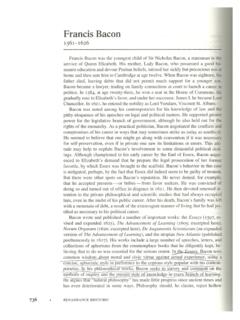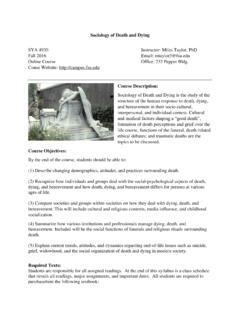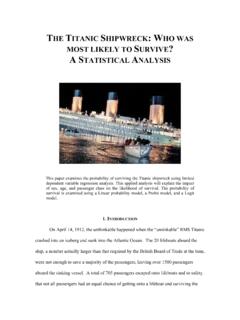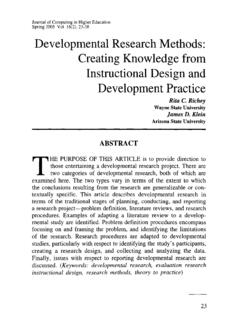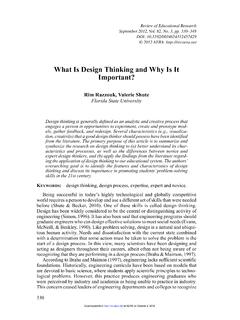Transcription of Stegall 1 Elliott Stegall Dr. Briggs HUM 6939/Critical ...
1 Stegall 1 Elliott Stegall Dr. Briggs HUM 6939/Critical Theory July 26, 2007 The Poetics of dead poets society ; In Defense of the Sentimental I went to the woods because I wished to live deliberately, to front only the essential facts of life, and see if I could not learn what it had to teach, and not, when I came to die, to discover that I had not lived. I did not wish to live what was not life, living is so dear; nor did I wish to practice resignation, unless it was quite necessary. I wanted to live deep and suck out all the marrow of life, to live so sturdily and Spartan-like as to put to rout all that was not life, to cut a broad swath and shave close, to drive life into a corner, and reduce it to its lowest terms, and, if it proved to be mean, why then to get the whole and genuine meanness of it, and publish its meanness to the world; or if it were sublime, to know it by experience, and to be able to give a true account of it in my next excursion.
2 Walden; Or, Life in the Woods - Henry David Thoreau (1817 1862) The above passage is read by the boys who ve resurrected the dead poets society at the beginning of each midnight meeting in an appropriately primordial setting, a cave. Stegall 2 Their ritualistic gathering is in honor of the film s romantic notion that a return to nature, or rather one s natural and individual self, is, ironically, best attained as a group. And while the film s gentle encouragement to break free from conformity is met with other subtler contradictions, its heart is true to its goal: to live life to the fullest, one must internalize the mantra Carpe Diem, seize the day. Director Peter Weir s 1989 film is lovely and moving, but from an Aristotelian perspective, can this modern film drama one frequently criticized for its sentimentality be construed as tragic?
3 Are the elements of tragedy plot, character, diction, thought, spectacle, and melody in accordance with its particular quality? Does the film adhere to and flow from an appropriately noble action; is the subject matter of a proper magnitude; is the action complete, that is, does it result from an inciting incident which itself is not caused; are the subsequent incidents linked by logical causation; does the language employ harmony and rhythm; and finally, are the elements of hamartia, mimesis, pity and fear, peripeteia and anagnorisis present, and do they result in catharsis? While not all of these elements will be addressed here at length, the main question is dead poets society an imitation of a noble and complete action, having the proper magnitude?
4 Will be. The goal then is to demonstrate that this gentle, male-centric weeper (perhaps it is worth noting that Aristotle believed women to be inferior to men) does indeed qualify as genuine tragedy, though not, admittedly, on the scale of a king s fall, a hero s demise, or a great city s destruction. Aristotle s insistence that action take precedence over character is well in keeping with the modern screenplay, at least in Hollywood, where action is king. Then again, while blockbusters are notoriously incident-driven and lacking humanity, incidents in other films are at least as frequently driven today by a Stegall 3 character s motivation, though the distinction between incident and character can easily become muddled.
5 Aristotle s devotion to cause and effect admits of the possibility of infinite regress, thus his idea of the prime mover or unmoved mover; we have to begin somewhere. Is Oedipus a determined product of his prophecy, an incident that precedes his actual existence, or does the prophecy take place because of the incidents that follow from his actions? Does Oedipus become king of Thebes because he is smart enough (a character trait) to outwit the Sphinx, or is it the incident of outwitting the Sphinx of which we are to take note? In terms of plot, it seems clear that some events occur outside the realm of character (prophesies, weather, etc.) and that as a result of these events, characters respond.
6 In terms of acting, this is considered a re-active character. Preferred is a character who acts of his own accord. In this respect, Aristotle s insistence that without action tragedy would be impossible, but without character it would still be possible (64) may make Aristotle the first teacher of the method approach to acting. In any case, in dead poets society , it is the teacher s, Mr. Keating s, predisposition to teaching poetry from a romantic stance that incites the incidents of the film. It can then be argued that an un-caused cause Mr. Keating s romantic predisposition is the first cause, an action which starts the movement of incidents which result in tragedy. The plot s active beginning is not necessarily after anything else.
7 It effectively starts up by itself. An additional caveat must make note of the reader-response methodology. The film s ability to be perceived as tragic rather than bathos resides in the viewer s level of sensitivity to the particular emotions of angst-ridden teenaged boys. Film critic Roger Ebert, no sentimentalist he, derides dead poets society as being Stegall 4 a collection of pious platitudes masquerading as a courageous stand in favor of something: doing your own thing, I think. It's about an inspirational, unconventional English teacher and his students at "the best prep school in America" and how he challenges them to question conventional views by such techniques as standing on their desks.
8 It is, of course, inevitable that the brilliant teacher will eventually be fired from the school, and when his students stood on their desks to protest his dismissal, I was so moved, I wanted to throw up. ( ) Evidently, Mr. Ebert did indeed experience catharsis, at least in the sense of purgation, but clearly not in the way the filmmakers wanted. Perhaps he is aware of other stories of young men in boarding school, especially A separate peace , that pursue ostensibly grander themes than the pursuit of one s identity, such as the darkness that lies at the hearts of men that can bring about their destruction. Additionally, that novel s specter of WWII hovering over the boys lives and reflecting the evil in mankind reduces to trivial the pleasant era of the 50s, the time frame of dead poets society .
9 This lack of overt seriousness in time and tone may help explain Ebert s unwillingness to suspend disbelief. As a baby boomer, Ebert may not look back to the 50s with comforting nostalgia at all. Perhaps the complete isolation of the Welton boys in a world devoid of race, class, or gender issues strikes him as unrealistic. Then again, these issues are not present in A separate peace either (obviously, boys in prep-school are of the upper class, but class in and of itself is not at issue in either story). But dead poets society screenwriter Tom Schulman makes it clear in the DVD s commentary track that his experience as a lad at Stegall 5 an exclusive and Christian prep school, despite his being Jewish, is accurately reflected in the film.
10 The environment is hermetic. The boys do not experience race or class issues, as they (the boys) are all virtually homogenous. There is neither radio nor television at the school. Nothing from the outside world interrupts their monastic solitude. dead poets society takes place in an insular world where politics are not the issue: resistance to authority pre-60s polite resistance is. The Korean War is over; Vietnam has not yet been heard of. The personal nature of the boys experience, then, makes for a personal filmic experience, though its themes qualify as universal. Who of us has not yearned to break free from unwanted societal expectations? This is particularly true of the artistic personality, evident in the character of Neil Perry.
